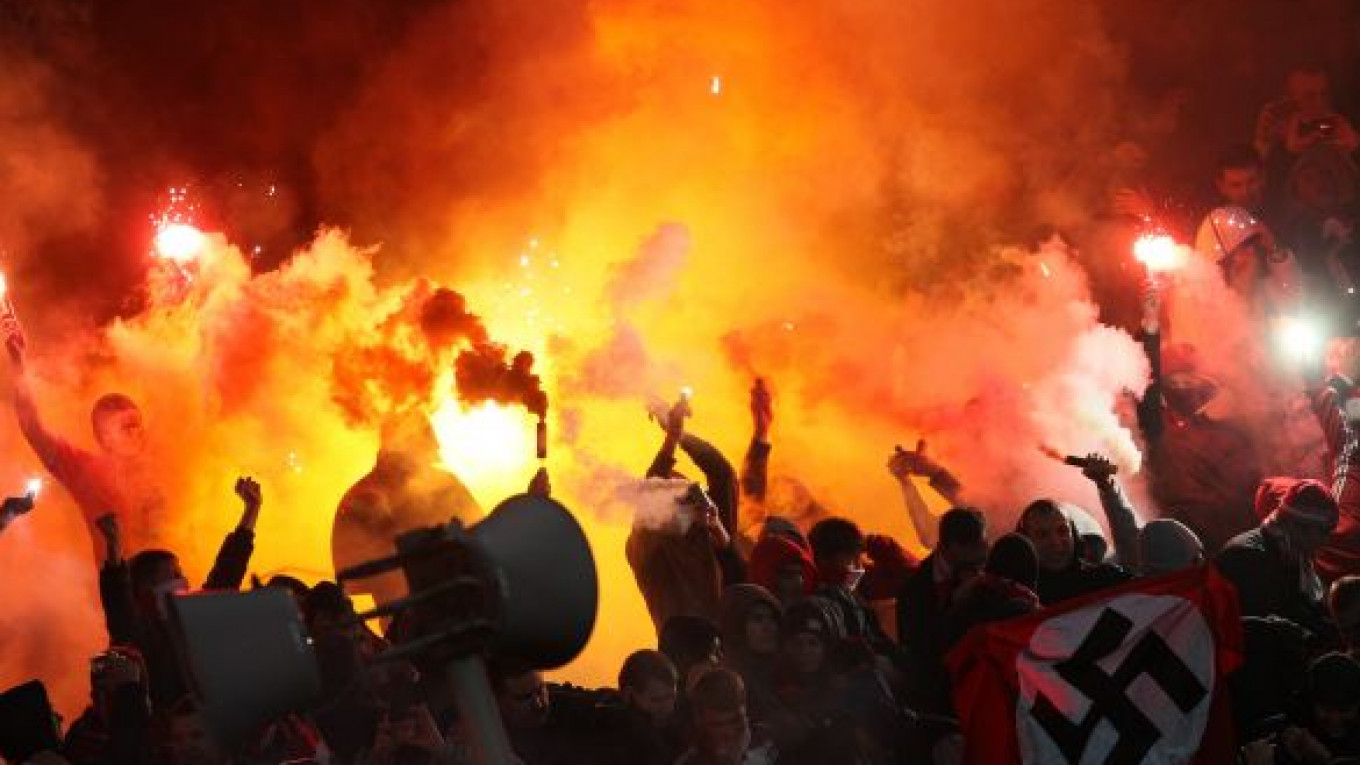YAROSLAVL — Police are investigating crowd trouble that forced the referee to stop a Russian Cup football match for half an hour while authorities dispersed belligerent fans with water cannons.
Fans fought with each other and tore up seats to hurl them at police during Spartak Moscow's 1-0 win at second-tier Shinnik Yaroslavl late Wednesday, while a Nazi banner was unfurled and pyrotechnics thrown on the pitch in the latest episode of hooliganism to afflict Russian football.
Several supporters were arrested; no injuries were reported. Police say they have discovered how illegal objects such as flares were smuggled into the stadium.
"Lots of Spartak fans deliberately wore plaster casts and hid them in there, and also in more intimate places," Nikolai Trifonov, Yaroslavl city's police chief said.
He also promised a probe into the swastika flag that appeared in the sector of Spartak fans, whose most hard core supporters are notoriously ultranationalist.
"We will get to the bottom of the appearance of Nazi symbolism," Trifonov said. "We have the photographs."
Spartak expressed regret over its fans' actions, saying in a statement, “This is not soccer hooliganism, but a real criminal act.” The club added that safety at Shinnik's stadium “was at a level of zero, which led to tragic consequences,” Interfax reported.
The Russian Football Association's disciplinary committee will meet Friday and Spartak could receive a home stadium ban of up to three matches over the unrest. Football's European governing body, UEFA, could also take action.
Fratria, the largest fan club for Spartak, said it had no relation to the unrest or the appearance of the Third Reich flag in the guest section of Yaroslavl's stands.
Russia over the summer introduced legislation from President Vladimir Putin aimed at curbing misbehavior at sports events, with the Sochi 2014 Winter Olympics and the 2018 football World Cup on the horizon. The so-called Fan Law comes into effect Jan. 19, 2014.
United Russia's Vasily Shestakov, a member of the State Duma's Physical Fitness and Sport Committee, said he regretted that the law had not come into effect earlier and added that he believed courts should arrest the offenders for 15 days rather than let them off with fines.
There have been more than 14,000 offenses committed at Russian sporting events over the last three years, according to Sports Ministry figures.
UEFA on Wednesday handed down a partial stadium ban to CSKA Moscow for "racist behavior" by their supporters during their 2-1 Champions League loss to Manchester City earlier this month.
After the game, Man City midfielder Yaya Toure, an Ivorian national, said he had been taunted with monkey chants and asked UEFA to ban CSKA from using their stadium for European games for "a couple of years or maybe a couple of months."
CSKA will have to close one of the stands at their home Arena Khimki stadium when they host Bayern Munich in their next Champions League fixture Nov. 27. The sector cited in the UEFA sanctions is usually occupied by CSKA's hardcore fans, the so-called "ultras."
The ban was handed out for "racist behavior of CSKA supporters during the above-mentioned match," UEFA said in a website statement.
UEFA cleared Romanian referee Ovidiu Hategan in a separate investigation over a failure to broadcast a stadium announcement warning fans about their behavior as the organization's protocol dictates. Instead, a UEFA stadium official has been fired, The Associated Press reported.
"The referee immediately asked the fourth official to request an announcement to be made to the public," UEFA said. "The venue director [the UEFA officer in charge of football operations], who had not heard the chanting himself, did not activate the procedure."
CSKA, which has already earned prize money of 8.6 million euros ($11.8 million) just for qualifying for the group stage, was not fined by UEFA.
Material from The Moscow Times was included in this report.
A Message from The Moscow Times:
Dear readers,
We are facing unprecedented challenges. Russia's Prosecutor General's Office has designated The Moscow Times as an "undesirable" organization, criminalizing our work and putting our staff at risk of prosecution. This follows our earlier unjust labeling as a "foreign agent."
These actions are direct attempts to silence independent journalism in Russia. The authorities claim our work "discredits the decisions of the Russian leadership." We see things differently: we strive to provide accurate, unbiased reporting on Russia.
We, the journalists of The Moscow Times, refuse to be silenced. But to continue our work, we need your help.
Your support, no matter how small, makes a world of difference. If you can, please support us monthly starting from just $2. It's quick to set up, and every contribution makes a significant impact.
By supporting The Moscow Times, you're defending open, independent journalism in the face of repression. Thank you for standing with us.
Remind me later.






